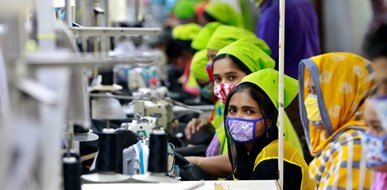[Blog] Covid-19 exposes structural inequality in global supply chain contracts
Published 16 February 2021By Mercedes Hering

Dhaka, Bangladesh - March 31, 2020: Workers producing personal protective equipment (PPE) for health professionals at a garment factory of Urmi Group in Dhaka on March 31, 2020. Sk Hasan Ali / Shutterstock.com
The Covid-19 pandemic exposes the structural inequality in global supply chain contracts, argues Asser intern Mercedes Hering on the Doing Business Right-blog. In the garment industry, there is a power imbalance tilted in favour of apparel brands and retailers. Lead firms cancelled or even breached their contracts with suppliers. How can we remedy this inequality?
Favoured by design
“Benefits and burden of the contracts are not distributed in a fair manner. In other words, global supply chain contracts are by design favouring European or North American brands. Thanks to them they can externalize unexpected costs, such as the fall in sales caused by the Covid-19 pandemic to their contractual partners in the Global South. Half of Bangladeshi garment suppliers had the majority of their contracts cancelled; around 1,136 factories and 2.26 million workers are said to be affected.”
Strategies of rebalancing
In a follow-up post, Mercedes Hering assesses four potential ways to better protect the rights of the poorest garment workers in the context of the Covid-19 pandemic. “The first option is a well-travelled one, brands could voluntarily decide not to use their unilateral contractual powers. Human rights due diligence regulation could also provide an avenue to prevent parties from unilaterally exercising contractual rights. (Foreign) state initiatives, through the releasing of specific development funding, might help to improve the workers’ welfare. Finally, courts could move towards a ‘relational’ interpretation of contractual obligations and force majeure.”
Read the blogs:
- The unequal impact of COVID-19 in the global apparel industry - Part I: The contractual roots
- The unequal impact of COVID-19 in the global apparel industry - Part. II: Strategies of rebalancing
Follow the Doing Business Right Blog to read all blogposts.
About Mercedes Hering
Mercedes Hering is a recent graduate of the LL.B. dual-degree programme English and German Law, which is taught jointly by University College London (UCL) and the University of Cologne. She will sit the German state exam in early 2022. In September 2020 she joined the Asser Institute as a research intern for the Doing Business Right project.
Doing Business Right project
The 'Doing Business Right' project focuses on investigating the role of law in securing the public interest in the context of transnational economic activities. The Doing Business Right Blog offers an academic platform for scholars and practitioners interested in questions related to Doing Business Right. The Doing Business Right project is a part of the Asser research strand Advancing Public Rights. This strand examines how international and European law may further the protection of public interests in a globalising (and privatising) world.
